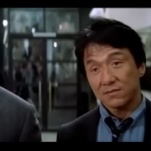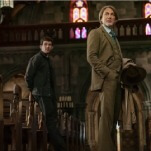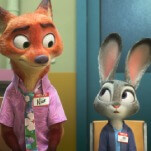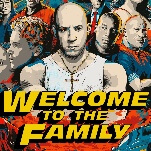But I feel like those are the exceptions rather than the rule. When employed correctly, improvisation can be a glorious thing, but I feel like it's increasingly used as a crutch for lazy filmmakers. Ideally, filmmakers start with a strong script and improve it through improvisation. But more often, it feels like the studio starts off with a really weak script that they figure an Owen Wilson or Will Ferrell can single-handedly save via improvisation. The result is an endless parade of half-assed, kinda-okay movies with a smattering of good ideas and funny scenes that would benefit greatly from a few more drafts and a lot more discipline. Instead of Knocked Up, we get a lot of films like Dodgeball: A True Underdog Story or The Ex, where a dream team of great improvisers utterly fail to redeem a worthless script.
I'm not arguing that improvisation is to blame for screenwriters' sad position in Hollywood. Screenwriters have historically wielded little power or influence, but I think the rise of an entire generation of comedy superstars with improv backgrounds (Ben Stiller, Owen Wilson, Jack Black, Will Ferrell, Vince Vaughan, Steve Carell) has further corroded the already-shaky status of the screenwriter. Audiences expect guys like Wilson and Ferrell to make up much of their dialogue anyway, so why obsess over perfecting a screenplay that'll probably just get ignored?
Then there's an older generation of comedy superstars, like Jim Carrey and Robin Williams, who get encouraged to improvise when they should be reined in as tightly as possible. And at the micro-budgeted end of the spectrum, we're seeing a slew of cheaply shot, largely improvised comedies in the tradition of The Office and Christopher Guest.
Then there's Christopher Guest himself, one of the godfathers of the big improv boom. For me, For Your Consideration felt like the last gasp of a man desperately in need of a new direction. Why bother with second-rate Christopher Guest knockoffs like the wholly underwhelming Confetti when the man himself is making second-rate Christopher Guest movies these days?
Improvisation can be a wonderful tool, but it increasingly seems to be viewed as an end unto itself, and that worries me. I love Robert Altman and Judd Apatow's comedies, and some of my favorite movies and television shows are heavily rooted in improvisation, but I feel like improvisation's overall impact on comedy these days is negative and getting worse.
That's a lot of output from one source, but Apatow is at the vanguard of a much larger movement in film comedy, which we agree has been moving toward improv-based, sketch-comedy traditions, and away from the screenwriter. You're clearly on the glass-half-full (or nearly empty) side of this argument, but I'm feeling increasingly optimistic that once this improv-based style gets through some growing pains, movies may come out funnier on the other side. What's missing from improv is the shape and refinement of a well-orchestrated screenplay, and that's something Apatow hasn't quite mastered yet: The 40-Year-Old Virgin and Knocked Up both crest the two-hour mark, which doesn't exactly make them "tight." So far, Apatow has gotten away with it (particularly in Knocked Up), because he's exceedingly generous to his ensemble casts, and they return the favor by keeping interest from flagging. I'm sure Knocked Up could have been trimmed into a 100-minute comedy, but that would probably involve losing some of the extraneous material (the Rogen gang's shenanigans, the Rudd/Mann marriage) that help makes the movie special.
In any case, I think now's a good time to point out what's good about improv-based comedy before getting to the caveats:
1. Spontaneity. My favorite moment in the '80s comedy Splash is when Tom Hanks, playing a fruit wholesaler, strolls into work singing "Zip-A-Dee-Doo-Dah," picks up a fruit from a crate, and improvises the lyric "Mr. Mango on my shoulder…" It's just such a whimsical touch, and there's no way it could come from the screenplay. The element of surprise is what makes great improvisers like Seth Rogen, Will Ferrell, and Owen Wilson so much fun to watch, because their best lines never seem canned. They're the ones doodling in the margins of a screenplay and finding ways to keep things from going stale.
2. It empowers actors. I'm not ready to christen Apatow the next Robert Altman or Mike Leigh or anything, but he clearly recognizes that his cast can bring a lot to the table when they aren't shackled to the page. Though it's hard to speculate where Apatow's scripts end and his actors begin, it's safe to say that the actors are given a lot of freedom to create their own characters. In my review for Knocked Up, I said "no one writes for ensembles better than Apatow," but I probably should have modified that to say that few get more out of ensembles than he does. It's unreasonable to expect one man to realize a dozen or more characters in all their particulars without help from his cast, but the players in Knocked Up, Virgin, Undeclared, and Freaks And Geeks are all vividly drawn. Then you look at a show like The Office, which employs several writer-actors (B.J. Novak, Mindy Kaling, Paul Lieberstein), and clearly there can be a positive shift in power to the people in front of the camera.
3. Other options are limited. This harks back to an earlier Crosstalk I had with Keith about the waning significance of screenwriters, but can you think of a single screenwriter besides Charlie Kaufman who has a distinctive comedic sensibility and who doesn't also direct his movies? (And even Kaufman, who's currently in production on his directorial debut, will no longer be that lone voice in the wilderness.) It's possible that the cult of the comedy superstar has wrested power from the talented screenwriters who could make better movies, but I'm doubtful that Hollywood is filled with Ruth Gordon/Garson Kanin tandems just waiting to emerge from the underbrush. Comedy is the work of auteurs these days, whether they're writer-directors like Wes Anderson or Noah Baumbach, or actors who carry flimsy, formulaic comedies across on the force of their improvisational skill.
Of course, there's a downside to this movement. and I agree with you about the many pitfalls of relying too heavily on improvisation. The biggest problem for me is shapelessness: Having a bunch of random shit happen in a movie doesn't a great comedy make. To me, Dodgeball is an excellent example of that phenomenon. For every inspired bit of randomness, like having Rip Torn throw wrenches at people, or pairing Gary Cole and Jason Bateman as announcers for ESPN8 ("The Ocho"), there's Ben Stiller flailing wildly as a pumped-up gym owner, or the dude acting like a pirate for some reason. You exit the theater having laughed a lot, yet you still feel vaguely dissatisfied, because all those haphazard gags add up to very little.
But I'm trying to stay positive for the time being, and maybe persuade you to do the same. Do you have any hope for the long-term viability of improv-based comedies? And if not, are there screenwriters or writer-directors out there that can rescue comedy from the improvisers?
Nathan: I share your excitement over the slew of incredibly exciting-looking projects Apatow has in development, but let's look at some other recent titles with Apatow's name attached to them: Fun With Dick And Jane, Kicking & Screaming, and Talladega Nights. Did Jim Carrey or Will Ferrell's manic improvisation in those films save them, or merely underline the desperation and lack of focus behind them?
For me, Talladega Nights, the strongest of the aforementioned bunch, embodies a lot of the problems I have with improv-heavy comedies. In my estimation, Talladega Nights is nothing but a bunch of intermittently funny, random shit that fails to cohere into a satisfying film, unlike Anchorman, which is a bunch of intermittently funny, random shit that does cohere into a satisfying film. My problem is that studios think they can throw a Ferrell and/or an Apatow at a terrible script and instantly make their problems disappear, but there's only so much either man can do.
Don't you worry about Apatow or Ferrell burning themselves out, especially considering their apparent workahol addiction? Remember those halcyon days when we critic types actually looked forward to movies from guys like Ben Stiller? My problem with the films of Stiller, Ferrell, Wilson, Black, and the like is that they're almost always good enough without ever being particularly good.
How many Owen Wilson movies not directed by Wes Anderson are legitimately good rather than "kinda fun" or "okay enough"? I think if studios didn't view Wilson as a veritable Captain Save-A-Weak-Script, his output wouldn't be so consistently half-assed and spotty.
I was watching John Patrick Shanley's Joe Versus The Volcano yesterday, and part of what I loved about it was that it was such a writerly film, full of the kind of beautifully turned phrases and casual poetry you don't see much in comedies these days. I admire the same thing about many of Wes Anderson's films, or films written by Tom McGuane, that sense that there's a single supreme intelligence behind a film, not just a bunch of funny, crazily overcompensated people throwing around jokes.
Writers with distinctive personalities generally get a chance to direct, sooner rather than later. Cases in point: Shanley, Shane Black, Mike White, Kaufman. Heck, even Paul Rudnick has a distinctive sensibility, even if it isn't one you or I have much affection for. Marci X, Isn't She Great, and Stepford Wives certainly owe much more to Rudnick than their directors.
You write about "actors who carry flimsy, formulaic comedies across on the force of their improvisational skill," but are they really making flimsy, formulaic comedies good, or merely palatable? Wilson and Ferrell's shtick has gotten fairly stale for me, in spite of all the funky shit they improvise. For me, the big superstars aren't scribbling in the margins as much as they're being asked to make the hilarity happen pretty much from scratch, which is a tall order even for the quickest, funniest minds on the planet.
I wish I could share your faith that comedy is evolving to a higher state even while the rest of pop culture devolves at an alarming rate. But I fear that the growth stage, as you put it, will never end, and that halcyon day when improvisation saves and revitalizes comedy will never truly arrive. I hope I'm wrong, but my pessimism about popular culture has seldom led me astray.
[pagebreak]
Scott: First off, it's a little unfair to equate Apatow-associated failures like Kicking & Screaming and Fun With Dick And Jane with successes like Knocked Up and The 40-Year-Old Virgin. He wrote, produced, and directed the latter films, so all credit should certainly be shifted in his direction, but he merely executive-produced Kicking & Screaming, which means next to nothing, and he's the credited co-screenwriter on Dick And Jane, which can often mean next-to-next-to-nothing. When the upcoming gay-panic comedy I Now Pronounce You Chuck & Larry comes out, how much of it could you really credit to the great screenwriting team of Alexander Payne and Jim Taylor, whose script has been kicked around and retooled for so long that the end result will probably bear little resemblance to the original? Questions of authorship, especially as they relate to screenplays, bring us into some very murky waters.
But I'll happily take the bait on Talladega Nights—which Apatow produced and Anchorman's Adam McKay directed—because I consider that a case when the rambling, shambling improv quality mostly paid dividends. I can understand your frustration with the unevenness of improv-heavy comedies, and I share them to an extent I'll explain in greater detail later. But here, I feel the hits outweigh the misses. For one, the three main players—Will Ferrell, John C. Reilly, and Sacha Baron Cohen—really excel under these circumstances, and I think something would be lost if you muzzled them with a conventional script. (Which film made better use of Cohen's abilities: Ali G Indahouse, or Borat? See what I mean? Improv wins in a walk.) The dinner-table sequence in Talladega Nights is an instant classic, and it's owed entirely to Ferrell and Reilly's ability to take a comic situation in crazy, unexpected directions.
You write, "My problem is that studios think they can throw a Ferrell and/or an Apatow at a terrible script and instantly make their problems disappear, but there's only so much either man can do." Assuming that your statement also applies to other reasonably skilled improvisers like Owen Wilson, Jack Black, and (to a much lesser extent these days) Ben Stiller, I'm going to take the glass-half-full side of the argument again. Granted, you don't want half-formed, poorly conceived movies to make it into production in the hope that one of these guys can save it with improvisation. And if that's become studio policy, it's certainly not something I endorse. However, without the likes of Ferrell or Wilson around to elevate schlock with their invention, you're left with just plain schlock. A forgettable little movie like Blades Of Glory couldn't be wispier in conceit, but watching talented people like Ferrell, Will Arnett, and Amy Poehler extract all the laughs they can from the world of ice skating is still a pleasure. And though Wilson is starting to a coast a little, his quirky readings used to make him the reliable bright spot of every movie he appeared in, from major roles in Shanghai Noon and The Big Bounce to scene-stealing minor ones in Meet The Parents and Zoolander.
I realize I'm playing devil's advocate here, to an extent. I wish there were more directors like Wes Anderson, Noah Baumbach, Alexander Payne, Mike Judge, Terry Zwigoff, or David O. Russell out there to bring more cohesion and personal style to film comedy. If I have a complaint with Apatow, it's that he hasn't figured out how to use the tools of the medium to his advantage; his films have an indifferent look, and he rarely uses the camera as a key component in a visual gag. I certainly wouldn't mind it if Hollywood were suddenly flooded with directors who could channel Ernst Lubitsch or early Blake Edwards, or writers who could stand up to the likes of Billy Wilder and I.A.L. Diamond. Something like that would really shrink a Talladega Nights down to size.
And yet I feel optimistic about where improv-based comedy is heading, for a couple of reasons. The first is that directors like Apatow are getting better at harnessing improvisation and throwing out funny material that doesn't necessarily service the movie. For example, the two Knocked Up deleted scenes circulating on the Web—one in which Jonah Hill decries Ang Lee for not showing enough hot gay action in Brokeback Mountain ("a mouthful of Ledger" is a phrase for the ages) and another in which an irritable obstetrician rants in the delivery room ("your vagina is not the same as the one in 207")—are hilarious standalone scenes, but it would have been a mistake to wedge them into the movie. Improvisation can be wonderful, but it's also extremely volatile when it comes to pacing individual scenes and controlling the overall picture. Presumably, as we head further into this age where improv and sketch-comedy-trained actors and actor-writers seem to be taking over, good filmmakers will be able to get a better handle on how to make it work for them.
The other reason for optimism is that the next generation of improvisers is more exciting to me than the last. As the painfully unfunny likes of Robin Williams and Jim Carrey are getting old and gray, their replacements are looking much more promising to my eyes. I was serious when I said that Apatow is the exception that's becoming the rule: He's involved himself with Ferrell for years, and the troupe members he's employed in his TV and film projects alone are having a major impact on the direction of film comedy. It's exciting that a major studio would build an project like Superbad around commercially untested (but awesome) talents like Hill and Michael Cera, and the future looks bright for Seth Rogen, Paul Rudd, Steve Carell, Leslie Mann, Jason Segal, Romany Malco, and hopefully many others in the Apatow gang.
Do you still see no hope in these improvisational wizards revitalizing film comedy, or are you that committed a comedy auteurist?
Nathan: I wasn't really linking Knocked Up or 40-Year-Old Virgin or Superbad with Apatow's gun-for-hire work on Will Ferrell movies. I feel like you can't go wrong giving Apatow $20 million to make a movie with his formidable band of wisecrackers, cut-ups, and mischief-makers. I sincerely hope that the future lies in those kinds of movies. I'm merely saying that the present involves desperate studios thinking they can throw an Apatow or Ferrell at a weak script and still come up with a winner.
I think your statement that "Questions of authorship, especially as they relate to screenplays, bring us into some very murky waters" applies to almost all the films we've talked about. DVDs give audiences an unprecedented level of information about how movies get made, but it's still generally fuzzy about who contributes what to movies, especially once improv and script doctors enter the picture. For all I know, everyone involved rigidly adhered to every line of dialogue and stage direction in the script of The Ex, under penalty of death. So what I'm arguing is to some extent a matter of hearsay and inference.
Maybe improvisation isn't solely, or even largely, to blame for the arch randomness and shapelessness afflicting so much contemporary comedy, but as I've argued throughout this piece, it certainly appears to be a contributing factor.
I think there's a lot of common ground here. I think we'd both like to see more comedies with a strong authorial sensibility. I think we're both encouraged by the success of the Judd Apatow factory. I wouldn't even say I'm anti-improvisation. I just have an extraordinary number of reservations about the way improv is currently used, and I suspect that Hollywood will learn all the wrong lessons from Knocked Up and The 40-Year-Old Virgin, attributing their success to raunch, young characters, improv-skilled actors, and high concept, and not to a strong screenplay, heart, and multi-dimensional characters.
Am I that attached to the comedy status quo, that I can't embrace improvisation as an evolutionary next phase in the genre's development? Fuck no. It's not that I'm at all attached to the current state of comedy. I just worry that as low as comedy has fallen, it can always get worse. Alas, my curmudgeonly skepticism is melting away in the face of your sprightly optimism.
Dagnab it, I'm willing to give these crazy kids that make up comical business and cinematical-type tomfoolery out of thin air a chance. What do we have to lose, ultimately? Screenwriters have been suffering through Hollywood's longest death scene since well before the talkies arrived. Maybe it's high time we put them out of their misery and let these guys making $20 million a movie make up all their own dialogue anyway.
Final thoughts?
Scott: Yes, we do have a lot of common ground here, and that realization gave me a big laugh. We might split hairs a bit over the degree to which we like, say, Talladega Nights, but I'm guessing that our opinions about the films, the directors, and the actors we've discussed are more or less the same. We're both enthusiastic about what Judd Apatow and his troupe are bringing to comedy. We agree about the specific pleasures and pitfalls that can come from improvisational techniques. We both lament the paucity of writer-directors who have a strong, cohesive comic vision. So basically, the rift between us is that we have fundamentally different ways of seeing the same thing: You the "curmudgeonly skeptic" and me the "sprightly optimist."
Ever the optimist, I'm still fond of my point of view on this issue. There's no question that improvisation has contributed and will continue to contribute to the production of bad movies. We haven't even begun to see what Borat hath undoubtedly wrought, and it's probable that the same wrong lessons learned from Farrelly brothers comedies or American Pie will also be applied to Apatow's sweet raunchfests. Still, I don't think counting the sheer number of bad movies made in a particular style is necessarily a good indication of whether that style is fruitful. You might remember The Ex or a post-Farrelly stinker like Say It Isn't So, because your pop-culture mind is like a steel trap for crapola. But I think it's important to remember that while every era in film comedy—or any other genre, for that matter—has a lot more chaff than wheat, the successes define the time. Everyone remembers how great Adam's Rib is, but there were no doubt countless awful screwball comedies produced during the same era that are collecting dust in a studio vault somewhere.
My main point, then, is to say that I'm excited about the incorporation of improvisation and sketch-comedy traditions into studio comedies, and I'm excited about the new generation of performers who are making it happen. The two films this year that stoked my enthusiasm on that front were Knocked Up and The Valet. We've already talked plenty about Knocked Up, so you know where I'm coming from there. But The Valet is an interesting case for me, because it's a genuine farce, which is a form of comedy that never gets made anymore. Its director, Francis Veber, scripted the model French farce in 1978's La Cage Aux Folles, though his track record as a writer-director has been spotty to say the least; he's even foisted several awful Americanizations of his work (Three Fugitives, Pure Luck, Fathers' Day) on the public.
To my surprise, The Valet opened earlier this year to mostly good reviews (Metacritic score: 68), and I can understand to some extent why other critics liked it. Because arriving as it did among some of the haphazard, uneven comedies we've been discussing here—Blades Of Glory had come out a few weeks earlier—the film does stand out; its elegant mechanics are a pleasure to behold. The scenes actually build upon each other and lead to payoffs down the roads, rather than just trying to accumulate as much randomly funny material as possible. Veber is like an architect who knows exactly what his building's going to look like before he rolls the camera, and his whole elaborate construction would fall if a single brick were out of place. It's the antithesis of improv-heavy comedy, which might begin with the idea of a building—a sketch on a cocktail napkin, comparatively—but hasn't completely determined how it's going to get there.
Here's the problem, though: I didn't laugh once during The Valet. Not once. And much as I appreciated its construction, it was like taking a trip to a musty museum to check out the woolly mammoth; I left convinced that the farce just isn't a viable form anymore. The best of these improv-heavy comedies, like Borat or Knocked Up, provide an invigorating, fresh experience, and makes you believe that comedy as a form is moving forward. And for that reason alone, I remain cautiously optimistic about where it's headed.







































